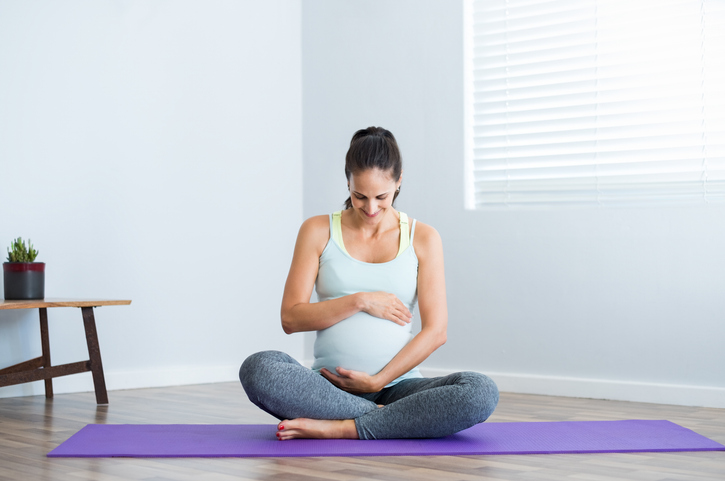Pregnancy is a beautiful and transformative experience, but it can also bring its own set of challenges. As your body changes and your mind navigates this new journey, taking proactive steps to nurture both can make all the difference.
By embracing a holistic approach that includes yoga, mindful practices, and proper self-care, you can foster a sense of balance, strength, and well-being throughout your pregnancy. Whether you’re expecting your first child or adding to your growing family, focusing on your physical and mental health can help set the foundation for a smoother, more joyful experience.
1. Embrace Prenatal Yoga for Flexibility and Strength
Prenatal yoga is a gentle yet powerful way to prepare your body for the physical demands of pregnancy and childbirth. Regular practice helps improve flexibility, build strength, and reduce common pregnancy discomforts such as back pain, swelling, and tension.
- Stretches for Flexibility: Prenatal yoga focuses on gentle stretches that open the hips, lower back, and shoulders, helping to ease the body’s changing alignment.
- Strength Building: Strengthening the core, legs, and pelvic muscles through yoga poses prepares your body for labor and promotes better posture as your belly grows.
- Mind-Body Connection: Yoga also helps you connect with your body and calm your mind, making it easier to manage stress and anxiety during pregnancy.
2. Practice Mindfulness and Relaxation Techniques
The emotional rollercoaster of pregnancy can sometimes feel overwhelming. Mindfulness practices, such as meditation and deep breathing, can help you stay grounded and calm.
- Reduce Stress: Practicing mindfulness can help manage the stress and uncertainty that can come with pregnancy, allowing you to stay present and in control.
- Breathing Exercises: Learning to breathe deeply and intentionally not only helps calm the mind but also enhances oxygen flow to both you and your baby.
- Visualization: Many expectant mothers find that visualization exercises—imagining a calm and positive birth experience—are empowering and relaxing.
3. Nourish Your Body with Proper Nutrition
What you eat during pregnancy plays a critical role in the health of both you and your baby. It’s essential to consume nutrient-dense foods to support fetal development and maintain your energy levels.
- Eat for Two (But Wisely): While you don’t need to “eat for two,” focusing on nutrient-dense foods such as leafy greens, lean proteins, and whole grains will provide essential vitamins and minerals.
- Hydration is Key: Staying hydrated helps with digestion, circulation, and overall comfort during pregnancy. Aim to drink plenty of water throughout the day.
- Prenatal Vitamins: Taking prenatal vitamins, including folic acid, helps prevent birth defects and ensures you’re getting the nutrients necessary for a healthy pregnancy.
4. Maintain Regular Exercise and Physical Activity
Staying active during pregnancy, with the guidance of your healthcare provider, can help you manage weight gain, boost your energy, and improve circulation. Low-impact exercises like walking, swimming, and stationary cycling are excellent choices.
- Walking: A simple, low-impact exercise that helps reduce swelling and improves circulation, while being easy on the joints.
- Swimming: The buoyancy of water provides relief from pregnancy-related aches and is gentle on your body while offering a full-body workout.
- Strength Training: Incorporating light strength training into your routine can help maintain muscle tone and prepare your body for the demands of labor.
5. Get Plenty of Rest and Sleep
Adequate rest is essential for your body to recover and rejuvenate. Pregnancy often brings challenges with sleep, whether due to discomfort or hormonal changes.
- Sleep Position: Sleeping on your left side can improve circulation, reduce swelling, and promote better oxygen flow to your baby.
- Nap When You Can: Listen to your body. Taking short naps throughout the day can help replenish your energy and improve overall mood.
- Create a Restful Environment: Try to maintain a peaceful and calming sleep environment—dim the lights, avoid screens before bed, and keep your bedroom quiet and cool.
6. Take Time for Emotional Well-Being
Emotional health is just as important as physical health during pregnancy. A strong emotional foundation can help you navigate the ups and downs of pregnancy with greater ease.
- Build a Support System: Surround yourself with supportive friends, family, or other mothers-to-be who can provide emotional support and understanding.
- Therapy or Counseling: If you find yourself feeling anxious or overwhelmed, seeking professional help from a therapist who specializes in prenatal care can provide additional tools to cope.
- Journaling: Writing down your thoughts and feelings allows you to express yourself and track your emotional growth throughout pregnancy.
Why Satya Yoga & Pilates Can Help Your Pregnancy Journey
At Satya Yoga & Pilates on Long Island, we understand the unique needs of expectant mothers. Our prenatal yoga classes are designed to support the changes your body undergoes during pregnancy. We focus on helping you build strength, maintain flexibility, and stay calm—both physically and mentally.
Are you ready to enhance your pregnancy with holistic practices? Contact us today to learn more about our prenatal yoga classes. Let us guide you towards a healthier, happier pregnancy!

